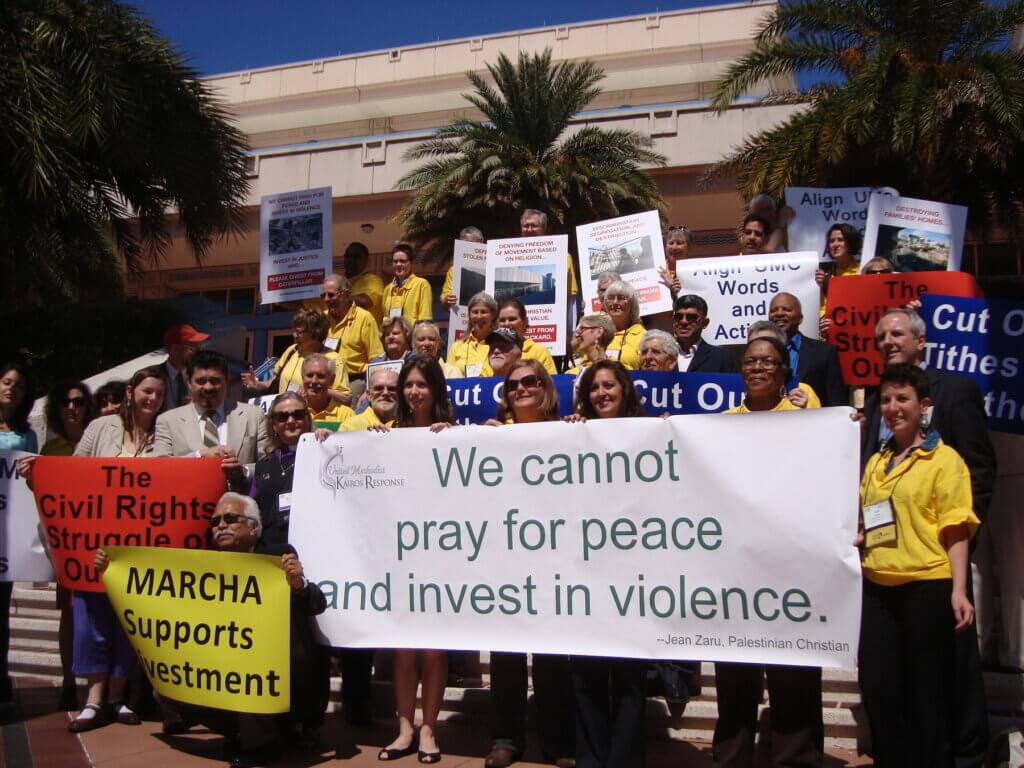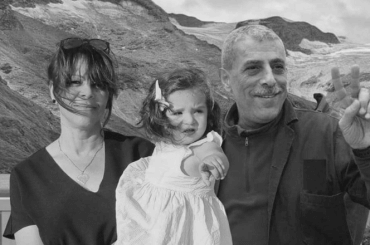Editor’s Note: The following letter was submitted to The Christian Century following the publication of its June 1, 2021 editorial, “Is there any hope for a just peace in Israel and Palestine?“. The Christian Century declined to publish the response.
To the Editorial Board,
For decades, many of us in mainline churches and other groups have been grateful for the Christian Century’s contributions to our ministry and mission through its religious news, articles exploring scripture and theology, and reporting on the intersection of faith and global events.
And for decades, we have noted Christian Century’s hesitation to comment on Israel’s illegal occupation of Palestinian territory, as writers of its recent editorial acknowledge.
But the June 1 editorial, “Is there any hope for a just peace in Israel and Palestine?”, moves us to express our deep disappointment in the Century editors’ disturbing consensus, and to add our voices to the conversation the magazine has joined.
We were shocked to read the editors’ caution, “When US Christians talk about Israel and Palestine, we should… recognize that we’re guests in someone else’s conversation….” On the contrary, US Christians, indeed all Americans, are a potent conversation partner; our tax dollars are currently supporting the state of Israel with at least $3.8 billion annually.
We reject the editors’ inference that American Christians are outsiders to the suffering in Israel/Palestine. To be sure, we note the important, spirited conversation within the global Jewish community regarding the character and future of the State of Israel. We also observe that our denominations and organizations have been engaged in ministry with the historic churches of the region and the broader communities of Palestine and Israel, some for 200 years or more. We believe that a conversation within the Christian community – about inclusivity, justice and human rights in Palestine and Israel – is just as critical.
Especially as our Christian family there has repeatedly cried out to the global church for solidarity, beginning in December 2009 with their profound statement of faith, hope, and love, the Kairos Palestine Document “A Moment of Truth,” again in their expanded and challenging July 2020 call to action, “A Cry for Hope,” and most recently in the “Statement of Repentance and Hope” issued by Christ at the Checkpoint Young Adults.
Christian Zionists make up the largest pro-Israel lobby in the U.S., blindly supporting Israeli policies while ignoring the suffering of Palestinians. We reject their erroneous and harmful theology, and we accept our responsibility both to name injustice where we see it and to seek to right it.
The weak and oppressed must be able to turn to friends and allies to stand with them, be those friends next door or across the world. It seems the Christian Century understood this in the 1980s when it condemned South Africa’s racist laws and policies. Black South Africans would never have ended the apartheid regime without millions of global citizens – and eventually institutions and governments – speaking and acting boldly to end that oppression.
Perhaps most disturbing in this editorial is the assertion, “Israel has the right to exist in the Holy Land as a Jewish state.” This statement needs to be examined and soundly rejected. For people of faith in the 21st Century, it is morally indefensible to argue for policies that uphold ethnic or religious nationalism.
A Jewish majority in Israel was established and has been maintained by the ethnic cleansing of Palestine. It started in 1947, intensified in 1948-49, and has continued ever since, most visibly today in East Jerusalem. Yet even now to describe Israel as a “Jewish state” – whether in your magazine or in Israel’s nation-state law – is to negate the existence of nearly two million Israelis who are not Jewish, twenty percent or more of the country.
Christian Century states that while a “two-state solution seems as far off as ever… [i]t’s also the only viable way forward.” As advocates for justice and freedom, we say it is not the place of the international community to make that determination. The formation of a political solution will lie in honest negotiations based on international law and equal rights for all of the people living there.
Focusing on a one- or two-state solution distracts everyone from the heart of the problem – the destructive effects of the Zionist project of settler-colonialism – and what should and can be done now: ceasing the appropriation of Palestinian land and resources; ending Israel’s military occupation including the blockade of Gaza; eliminating Israel’s policy and practice of ethnic cleansing; and providing equal rights under the law for all citizens of Israel.
This year, we have seen our nation’s discourse about Israel/Palestine shifting dramatically, including a growing recognition that Israel is maintaining an apartheid regime. This recognition has been encouraged by two remarkable reports: “This Is Apartheid” issued in January by B’tselem, Israel’s respected human rights organization; “A Threshold Crossed: Israeli Authorities and the Crimes of Apartheid and Persecution” released in April by the Nobel Peace Prize recipient, Human Rights Watch.
We hope that editors of the well-respected Christian Century will reexamine their positions and join the national and global discourse in ways that will illuminate a faithful and courageous way forward for Israelis and Palestinians alike.
Alliance of Baptists
American Friends Service Committee (AFSC)
Disciples Justice Action Network
Disciples Palestine Israel Network
Disciples Peace Fellowship
Episcopal Peace Fellowship Palestine Israel Network
Friends of Sabeel North America
Israel Palestine Mission Network of the Presbyterian Church, USA
Kairos USA
Mennonite Palestine Israel Network
Palestinian Christian Alliance for Peace
Samuel DeWitt Proctor Conference
United Church of Christ Palestine Israel Network
United Methodists for Kairos Response (UMKR)
Interfaith & Other Endorsers
American Muslims for Palestine
Chicago Faith Coalition on Middle East Policy
Fellowship of Reconciliation USA
Indiana Center for Middle East Peace
InterReligious Task Force on Central America and Colombia (IRTF Cleveland)
Jewish Voice for Peace
Shomeret Shalom Global Congregation
Unitarian Universalists for Justice in the Middle East
US Campaign for Palestinian Rights



Yes. Jewish Supremacy is a Jewish problem. Christian Zionism is a Christian one. And Israel, as an apartheid and Jewish supremacy state, is an American problem. If the US ever stops writing the checks, Israel will have to change.
Wait! This changes EVERYTHING! Brooke Goldstein, director of the Lawfare Project, says “there’s no such thing as a Palestinian person”! No, I’m not making this up –
https://www.youtube.com/watch?v=IDqeS157ZJQ
This seems to be a dialogue between Christians with no theological content. Christian theology has moved quite strongly over the last few decades towards a much more positive view of Rabbinic Judaism (not necessarily reciprocated – Israel Yuval Haaretz August 15 2020) and at least indirectly towards Zionism. There’s a good article by Philip Cunningham and Adam Gregerman ‘Genuine Brotherhood’ on the Catholic side and one by Philip du Toit ‘The Radical New Perspective on Paul’ on the Protestant side. The New Perspective on Paul, which denies that he was ‘converted to Christianity’ and considers that he remained deeply Jewish, has had very great effects in theology and, for some people, in politics too. The phrase ‘never revoked Covenant of Sinai’, found in many Catholic statements with echoes in Anglican ones that I know, is ambiguous but potentially very drastic.
If it’s not revoked doesn’t the complete rejection of apartheid in the name of faith, the one basic principle of this Open Letter, come into question? The Covenant did not lead Joshua or the righteous Kings to set up a society of commonality between different groups of different cultic practice but a society in which they had, at least, to keep somewhat apart, at least while God’s name is made great from the rising of the sun unto the going down of the same.
Modern theology, often written in a liberal spirit, will be a major break on the ability of the Churches to proclaim justice for the Palestinians.
Christians have a role to take the New Testament and the Gospels, some of which were written hundreds of years after the destruction of the Second Jewish Temple and many generations later, and to accept that there are many contradicting messages and stories in them. Once you understand that the world is not perfect and that many Christians, in the name of Christianity, have not done the right thing as regards to their treatment of Jews, based on emotions and lack of understanding of the overall message from the Gospels, that now you can stop and rethink your ongoing attacks towards Jews and Israel and question your blind support for the Palestinians. If not you will remain a prisoner to the hate you hold within. The Jews are not perfect, just like everyone else, but it’s time for you to blame the Romans for the killing of Jesus. From my understanding if Jesus had not died in the way he did, there would be no Christianity today and Jesus would have been known only during those times as a Rabbi that did many good things and you would not have known his name today.
The hypocrisy of many Christians is also felt and seen today in areas currently under the control of the Palestinian Authority where Christians have suffered at the hands of Muslims. The number of Christians in Bethlehem as dwindled to such low numbers due to Islamic violence and pressure. And they all keep quite about this. Bunch of hypocrites you are.